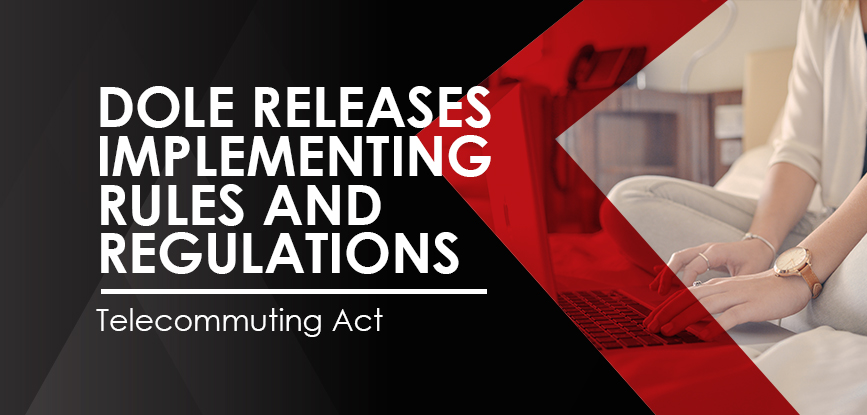
DOLE releases Implementing Rules and Regulations of Telecommuting Act
The Department of Labor and Employment (DOLE) issued on April 1 the Implementing Rules and Regulations (IRR) of Republic Act No. 11165, otherwise known as the “Telecommuting Act”. It was signed by DOLE Secretary Silvestre H. Bello III on March 26, 2019.
The Telecommuting Act was signed into law in December 2018 by President Duterte. It encourages employers from the private sector to offer “telecommuting” to their employees. Telecommuting is a work arrangement that allows employees to work from home with the use of telecommunication and/or computer technologies. Under the new law, employers may offer a voluntary “telecommuting program” to employees who wish to work from an alternate workspace like their homes.
Employees who prefer to work from home will receive the same rights of an in-house employee, such as but not limited to paid work hours, minimum and maximum number of work hours, overtime pay, night differentials, and leave benefits. However, the telecommuting program must adhere to the minimum labor standards of DOLE.
The IRR also states that employers must submit their telecommuting work schedules to DOLE while notifying the agency on the adoption of such work arrangements. They must also accomplish a DOLE-prescribed report form and submit it to the nearest DOLE office having jurisdiction over the location of their company’s principal office.
Salient Features of the IRR
Under Section 3 of the IRR, employers can offer a work-from-home arrangement “on a voluntary basis or as a result of collective bargaining.” However, offering this arrangement and the terms and conditions must not fall below minimum labor standards.
While employees working at a regular workplace are entitled to a “rate of pay” or a variety of incentives, Sec. 4 of the IRR covers all telecommuting individuals with the same set of “applicable rules and existing Collective Bargaining Agreements (CBAs), if any.”
The IRR also stresses the importance of “Data Protection” for employees who prefer to work from an alternative workplace. Sec. 5 states that both parties shall agree on minimum standards that will protect their personal information while utilizing the available technology and software to further enhance their security and privacy. According to the IRR, “the provisions of the Data Privacy Act of 2012 shall have suppletory effect.”
These rules and regulations will take effect fifteen days after its publication in a newspaper of general circulation and posting on the DOLE website.
Telecommuting Act Receives Positive Feedback
Before the drafting and issuance of the Telecommuting Act’s IRR, many employees expressed their support for the implementation of an alternative work arrangement that will help Filipino professionals work with ease without the need to report to a regular workplace.
Presidential Spokesperson Salvador Panelo lauds the lawmakers of RA 11165. He states that the Telecommuting Act “is fast becoming the new norm with the Filipino labor market starting to open up with alternative avenues in view of computer technologies.” Panelo remains optimistic that the latest work arrangement can contribute in easing the traffic conditions in Metro Manila and other urban areas.
Senator Joel Villanueva, the principal author and sponsor of the law, expressed his gratitude to the government for signing the Telecommuting Act. “We thank the President for supporting our bill that will promote our workers’ right to work-life balance and flexible work arrangement,” Villanueva said in a previous statement last January 11, 2019.


Ask ko lang sino po ba dapat magshoulder ng internet pag work at home?
Good day, Kl!
Yes, the employer will shoulder your monthly internet fees if they allow you to telecommute as an alternate work arrangement. Your employer might also lend you a company phone for business calls and a laptop you can use for work.
However, if your employer did not offer the telecommuting work arrangement, you must shoulder the fees of your internet connection. The same goes to your phone and laptop or personal computer at home.